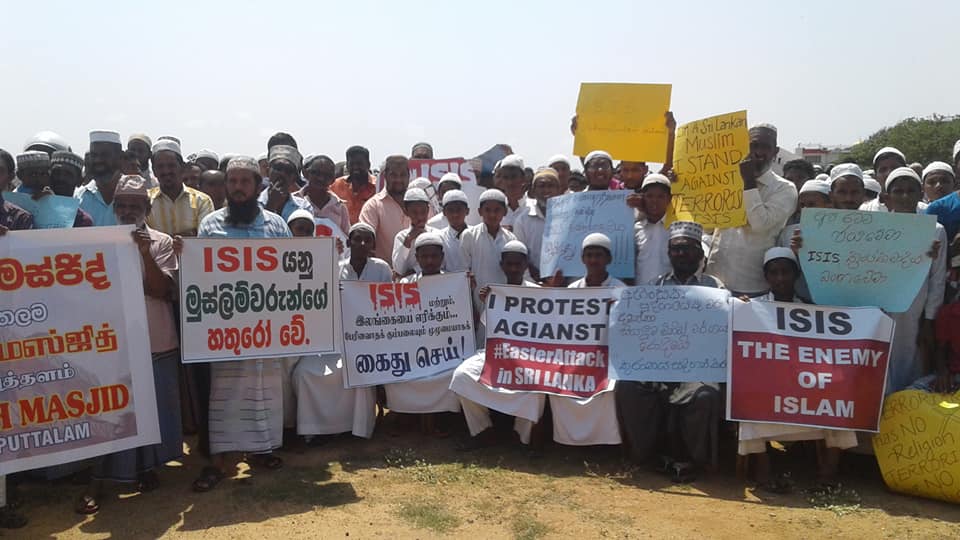
As Sri Lanka marks the 10-year anniversary of the end of its long internal war this week, human rights groups are demanding accountability in the mass atrocities that marked the final stages of the conflict, in which many thousands were displaced or “disappeared.” The International Committee of the Red Cross says 16,000 people are still missing. (The New Humanitarian, Amnesty International) Ominously, the commemoration comes amid a new wave of communal violence following last month’s terror attacks that targeted Christians on Easter Sunday. In days of anti-Muslim riots that started May 12, mobs moved through towns in the northwest, ransacking mosques and attacking shops with petrol bombs. The riots came amid the Muslim holy month of Ramadan. The Buddhist militant group Bodu Bala Sena (BBS), which has been repeatedly linked to such pogroms since its founding in 2012, is named as having instigated much of the violence. (Sri Lanka Campaign, Al Jazeera)
BBS adherents had been pressing for the release of the group’s imprisoned leader Galagodaththe Gnanasara Thera on the Buddhist holiday of Vesak Poya, which coincided with the anniversary of the end of the conflict, and when many convicts are traditionally pardoned. President President Maithripala Sirisena resisted such pressure, but was widely reported to have paid a Veska visit to Gnanasara Thera in the prison hospital where he is being held. (Sri Lanka Times, Asian Tribune)
Some Sri Lankan Muslims have meanwhile mobilized to repudiate the attacks, which were claimed by ISIS. Muslims at peace vigils across the country have held signs reading “We stand with Christians” and “#UnitedAgainstHate.”
Ironically, some of the Muslims targeted in the pogroms have been followers of the Ahmadiyya sect, held heretical by orthodox Sunnis, who settled in Sri Lanka after fleeing persecution in Pakistan, Bangladesh and elsewhere. Scores of Ahmadi Muslims in the town of Negombo are reported to have been summarily evicted by their by landlords. “Today these refugees have become refugees again in Sri Lanka. They have been displaced for a second time,” Ruki Fernando of Sri Lankan human rights group Inform told reporters. (Globe Post)
Portending worse things still, former defense secretary Gotabaya Rajapaksa, accused by rights groups of war crimes during the final months of the civil war, has announced he plans to run for the presidency in the elections scheduled for later this year. Rajapaksa, the brother of former president Mahinda Rajapaksa, under whom he served as defense secretary, declared his candidacy on April 26, five days after the bombings. He has openly expressed his support for the BBS. (Al Jazeera, Foreign Policy, CNN)
Fortunately, there have also been voices of dissent among the Buddhist majority. One anonymous commentator wrote on PeaceInsight: “I am a member of the Sinhala Buddhist community and I am not sure that we have learned the lesson from Black July or that we remember it. If we continue to ignore the signs of increasing violence and we allow our politicians to protect the extremist groups, we might live again the same situation of the last few days of July 1983. The fanaticism this time will be against the Muslim community. The perpetrators will be the same, with the addition of the Buddhist extremists.”
The Black July violence of 1983 began when Tamil separatists in northern Sri Lanka killed 13 newly recruited soldiers who had reported for duty only a day earlier. Over the following days, Sinhalese mobs killed between 400 and 3,000 Tamils around the country, triggering the civil war that would last 26 years.





Sri Lanka to ban burqas, close 1,000 Islamic schools
Officials in Sri Lanka announced plans to ban burqas in public and close more than 1,000 Islamic schools. These policies are the latest in a string of decisions targeting the country’s Muslim minority. The ban will be enforced under the Sri Lankan Prevention of Terrorism Act, which has been denounced by the EU and international watchdog organizations for causing arbitrary detentions and the “endemic and systematic use of torture” against marginalized communities. (Jurist)